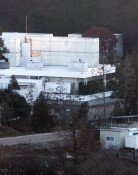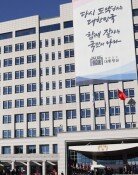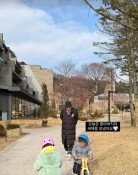[Opinion] The Aftereffects of `Political Laundering`
[Opinion] The Aftereffects of `Political Laundering`
Posted January. 03, 2002 09:02,
The New Year brings with it many things which the country must deal with both inside and outside its borders. Last year`s September 11 terrorist attacks will bring strong winds of `U.S. Supremacy` in global politics, economics, military, and culture. It does not bode well when U.S. President George W. Bush adds to this by calling the New Year `The Year of War`.
Domestically, there are countless problems transferred over to the New Year, including the health insurance system with couple trillion won at stake, the teacher retirement age issue, corporate mergers and reform, and political reform. The Kim Dae Jung administration brought up all these issues in the name of reform, which have now become hopelessly tangled and a heavy burden for governing the nation. The year also brings with it sad historical memories. 120 years ago (1882), the soldiers requested better treatment and appealed to King Kojong. This led to an insurrection and became the scapegoat for the falling of the nation. 120 years before that (1762), Yongjo locked his heir in a box and killed him.
Returning to the present, the riddle that Korean society needs to solve this year is the 16th Presidential Elections on December 19. When it comes to presidential elections, a strange phenomenon occurs in our country that cannot be seen anywhere else. It is called `political laundry`. The followers of the elected winner conduct a comprehensive political cosmetic surgery. The career profile, education and social experience, political speeches, deeds, records, historical events all undergo a radical change in appearance. Unseemly things in the past such as colluding between politics and business disappear under cover. Who will dare to say anything when all of this is done for the authority and dignity of the President`s office?
This kind of artificial embellishment continues throughout the inception of the new presidency. Supporters who claim to be close aids and credible sources dominate the scene and the huge chain of irrational power starts to solidify. The eulogy that pours forth wraps one person`s real identity in exaggerated colors. Soon the elected becomes hypnotized by the illusion of his omniscience and omnipotence, and total power becomes the only goal. He also suffers from the temptation to reduce the responsibility to govern to taking revenge and showing favoritism. As a tool for desensitizing the public and distorting public sentiment, `political laundering` is more frightening than `money laundering`.
While the power structure is in the process of consolidation, surrounding aids are trying to infuse every word and act of the election winner with presidential authority. It is a scheme to elevate their own status, but we know very well that it will ultimately destroy the president`s leadership.
The substance of leadership, however, is not something you can cover up forever. `Political laundering` usually goes on for about two months after the inauguration. The path of one administration is determined in that time.
Another strange phenomenon that happens in Korean elections is the fact that the candidate will step over his mentor in the same political faction. Where does the saying `Step on me first` come from? Whether it is a scheme for policy-making, irrational power-grabbing, or personnel conflict, it is an open acknowledgement from the powerholders that there is a problem. The saying demonstrates that the problem of leadership has not been resolved by `political laundering`.
This is, of course, to be expected for the president of a military government. Yet, it is not altogether different from civilian or popular governments. The president rules like an emperor. How many presidents have we had who truly touched the people`s hearts? Frequent inspections of the government and visiting factories do not make a good president. Presidential interventions can actually make things more difficult for them. A president receives great amount of power and responsibility in the initial phase of the term so that he may run the nation well. Yet, responsibility appears to fall by the wayside from the start and power becomes the main objective. That is why the people become distant. Is not an imperial president the consequence of `political laundering` after all?
Now, we seek a person who has the courage to refuse `political laundering`. We do not need a supreme commander who thinks that only he can solve every problem, but rather an honest person who can acknowledge his weaknesses and needs. Electing the right person as the president in a year with many difficult challenges is a comfort. As stated before, the fate of an administration is sealed in the initial phase. Do we not say that we learn all the wisdom we need to live in kindergarten? Let us watch and see this coming presidential election, observing how the candidates will take their first steps.
Choi Kyu-Chul (Chief of Editorial Staff)
kihang@donga.com







